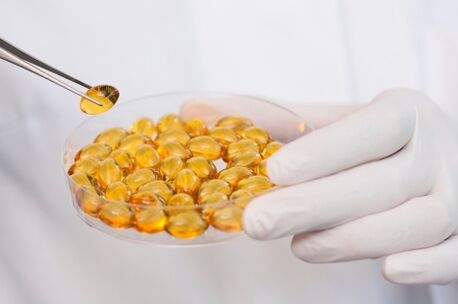What is lipoic acid? It's a light yellow powder with a bitter taste that can easily be confused with hundreds of other chemicals. However, the unique properties of an unusual combination of fatty acid and sulfur draw attention to lipoic acid: it promotes weight loss, gives the body extra energy, protects the brain and is possibly the key that opens the door for mankind to the land of eternal youth. . . Fascinated?

Lipoic acid is known to sometimes improve the effectiveness of weight loss exercises. How else can it help the body?
Lipoic acid: cleaner or special unit?
Lipoic acid, also known as LA, it's also thioctic acid, it's also lipamide, it's also vitamin N, which often appears under the name of a semi-vitamin or a vitamin-like substance.
The fact that LA is synthesized by the human body prevented it from becoming a "full" vitamin. It is also interesting that lipoic acid dissolves in both fat and water, while its other colleagues in "vitamin activity" can only boast of a comfortable living space.
Lipoic acid is real Figaro: it is here, it is there. By accompanying enzymatic reactions in mitochondria, it helps to make the process of energy production by the cells as efficient as possible.
Lipoic Acid Molecules - Miniature Recycling Plants. The substance "absorbs" the breakdown products of amino acids and enables you to squeeze out the absolute maximum of substances that our body needs, and then removes all "waste products" from the body.
In recent years, doctors have seriously started talking about lipoic acid as the future elixir of eternal youth, as this substance has experimentally proven its ability to prevent DNA damage, which is believed to be the real cause of cell aging and the extinction of vital functions.

Lipoic Acid And Weight Loss: Why It Works
Lipoic acid is able to "tame" the forces that cause us to gain weight and hold back excess fat. Its activity in this function is diverse. So, when losing weight, lipoic acid:
affects the areas of the brain responsible for appetite and reduces hunger;
stimulates energy consumption;
increases insulin sensitivity;
qualitatively improves the absorption of glucose by cells and lowers blood levels;
decreases the liver's tendency to accumulate fat.
Practice shows that lipoic acid, when combined with diet and exercise, gives the best results in weight loss. There is a logical explanation for this. With a "change in the course" of the diet, chemical changes occur in the body (most pronounced with a protein, paleo or keto diet, which gives the fastest result and the most noticeable side effects) and with increased strength and cardiovascular exercisemicrotraumas occur in the muscles.
For this reason, oxidative processes in the body are intensified, which leads to an "increase" in the formation of free radicals, damaged molecules.
So lipoic acid is able not only to neutralize it, but also to absorb it, and then - to recover and plunge back into the fight against the antioxidants.
This is another unique quality of lipoic acid: it is the only "reusable" antioxidant.
In addition, vitamin N has a friendly nature: lipoic acid can work together with other substances that fight free radicals (vitamins C and E, as well as glutathione) and even enhance the effects of their allies.
Is Alpha Lipoic Acid the First?
For the first time, researchers succeeded in extracting lipoic acid from bovine liver cells in the 1950s. Hence, alpha lipoic acid for weight loss began its "medical career" as a hepatoprotector. However, scientists discovered more and more new properties of an amazing substance and, moreover, learned to synthesize them quite qualitatively under laboratory conditions.
Today chemists produce two chemically "mirror-like" variants of lipoic acid - R ("right isomer") and S ("left isomer") for different purposes. There are some differences in their molecular composition and the human body only absorbs R-type lipoic acid efficiently and almost completely.
The latest methods allow a higher purity of the drug and a high concentration of R-lipoic acid. It is clear that such a substance has great potential for all of LA's inherent properties, and it has been experimentally proven that it is the R-isomer that increases the sensitivity of cells to insulin. However, the production of a pure R variant of the substance is quite complex, which of course has an impact on the cost of the product.

The cheaper alpha-lipoic acid, in which the "right isomer" and the "left isomer" are present in equal proportions, has become the most popular.
Products with natural lipoic acid
Offal: Kidneys, heart, liver;
vegetables: Broccoli, spinach, Brussels sprouts, peas, tomatoes;
Other sources: Brewer's yeast, brown rice.
When your strength is insufficient
Many living organisms (including humans) are able to synthesize a certain amount of lipoic acid on their own - this explains the fact that there is a high concentration of this beneficial substance in the internal organs of animals.
Unfortunately, you don't have to rely entirely on food sources from LA: As the American specialist in functional nutrition Dr. Jeffrey Webb explains, our enzymes are unable to "break" the bond between alpha lipoic acid and the amino acid lysine. accompanied by lipoic acid migrates through the gastrointestinal tract in the form of food. Hence, from an ALA-rich dinner we only get crumbs of the valuable substance.
The question arises: what if humans can only make a modest amount of lipoic acid and even less with food, as we lived until doctors learned how to synthesize it?
The answer is simple: Those who do not suffer from metabolic disorders, are not prone to obesity and have not accumulated a whole load of free radicals can get by with the amount of free alpha lipoic acid. But the deterioration in the ecological situation and the rapid deterioration in eating habits in the 21st century have pushed lipoic acid out of the shadows.
If you need the help of a substance that is an antioxidant, a water- and fat-soluble vitamin, a stimulant of lipid metabolism and, as a bonus, protection against degenerative brain diseases, discuss with your doctor the possibility of taking alpha-lipoic acid as a dietary supplement.
Lipoic acid: how much to take
The standard recommendation your doctor can give you for alpha lipoic acid as a supportive and tonic is 25 to 50 mg per day. However, it can vary depending on the intended use of the vitamin-like substance and the state of health of the "host".
Those who exercise to lose weight can be prescribed to "eat" 100-200 mg of alpha lipoic acid, often as part of complex preparations that also contain L-carnitine (levocarnitine). LA enhances the "fat burning" effect of this natural anabolic.
It should not be forgotten that such food supplements are taken in strictly time-limited courses so as not to "get used" the body to the constant intake of metabolic stimulating substances and not to cause a withdrawal syndrome, which is fraught with the refusal of the body to produce these substances itself.
Since lipoic acid has the ability to maintain the effect of insulin and even partially take over its functions in some processes and reactions, diabetics are often prescribed higher doses of 400 mg LA daily.
Famed neuroscientist David Perlmutter, author of The Brain Nutrition Diet, believes 600 mg of alpha lipoic acid is a must have for anyone interested in preventing neurodegenerative diseases and eradicating the effects of years of rapid carbohydrate abuse.
In recent American experiments, alpha-lipoic acid, taken at a dosage of 1, 800 mg per day for 20 weeks, helped lose 9% of body weight in very obese patients without changing their diet.
In the event that you decide to spend money on the more advanced and expensive R-isomer of lipoic acid, the dosage should be cut in half due to its high bioavailability.
It should be noted that for all the usefulness of lipoic acid, overdose can lead to indigestion and nausea, increased skin sensitivity and muscle pain, and a sharp drop in blood sugar levels with all the accompanying "surprises" such as weakness, dizziness, and severe hunger.
It is therefore imperative that you consult your doctor before going to the pharmacy to buy a large dose of lipoic acid for rapid weight loss: a specialist will help you determine the most effective and safe dose for you, your slimness and your health.
Alcohol is strictly contraindicated during the entire ingestion of lipoic acid. For optimal absorption, the dietary supplement should be consumed 60-30 minutes before a meal or at least one hour after a meal.
Noticeable and tangible results of taking the substance can be seen after eight weeks at the earliest.

































